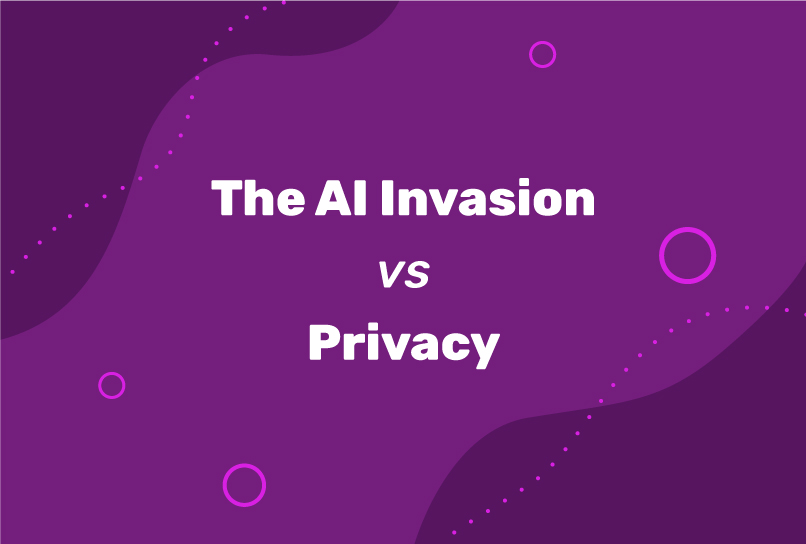The age of the thinking machine is upon us. If there were ever a doubt about a tech future populated with virtual robots carrying out complex human operations, such skepticism would’ve well been quashed when ChatGPT entered the equation in late 2022.
However, amid excitement about the revolutionary capabilities of chatbots, the possibility of AGI (Artificial General Intelligence), and other similar Generative-predictive technologies, there is genuine concern about how AI affects online privacy and security.
This article explores in detail what this technology will mean for data privacy and the security of individual internet users, corporations, and businesses with an online presence. Brace yourself for a revealing journey of what you stand to lose, or gain.
What is AI?
Artificial Intelligence (AI) is the capacity of virtual or physical machines to perceive, synthesize and infer data and information in a manner similar to humans.
Essentially, AI involves the creation of intelligent machines capable of thinking, reasoning, and learning like humans, using Neural Networks.
The AI you see today is not a single technology, but a combination of advanced technologies such as machine learning, deep learning, natural language processing, robotics, and computer vision. These technologies work in tandem, enabling machines to learn from data, recognize patterns, and make informed decisions based on that data.
Machine learning is a fundamental component of AI, and it primarily involves teaching machines to learn from data without explicit programming. In other words, machine learning algorithms analyze data, identify patterns, and learn from those patterns to make predictions or decisions.
This technology has transformed businesses’ operations, allowing them to make data-driven decisions, automate complex processes, and achieve better outcomes.
But with great power comes great responsibility.
Online Privacy and Security in the Modern Era
Online privacy means keeping confidential all sensitive data we share online, such as our names, addresses, credit card details, and email. Online security, on the other hand, is the process of protecting our online data from cyber threats like malware, hacking, and other attacks.
As we store more of our personal information online, we must take measures to ensure its safety. Today, safeguarding our online privacy and security has become a critical concern, as this World Economic Forum survey highlights.
The Role of IoT Devices
The Internet of Things (IoT) is a network of physical devices, vehicles, and home appliances fitted with sensors, connectivity, and software to collect and exchange data. IoT devices have changed how we interact with technology, raising concerns about online privacy and security.
One of the key benefits of IoT devices is their ability to collect and process data in real time. However, this constant data collection raises privacy concerns if it is not secured properly. The outdated software and firmware of some devices can be exploited by hackers, which can potentially expose personal information.
To improve the security and privacy of IoT devices, manufacturers should prioritize security measures in the design and development of their products. This includes using up-to-date software and firmware, implementing strong authentication protocols, and providing regular security updates.
Users also have a role to play in securing their IoT devices. They should change default passwords, keep software up-to-date, and limit access to their devices only to trusted individuals. Users should also be aware of the data their devices collect and how it is used.
Importance of Online Privacy and Security
In today’s digital world, it’s crucial to prioritize online privacy and security. The increasing use of technology and the internet makes it easier for people and organizations to access and share information. However, this also means that sensitive data can be easily compromised if the proper precautions are not taken, with a European Consumer Organization survey highlighting this fact.
There are several reasons why online privacy and security are important, including:
- This misuse of sensitive information is a major concern. Personal and sensitive information such as financial details, medical records, and social security numbers are frequently shared online. In the wrong hands, they can be used for criminal activities, identity theft, and other fraudulent activities.
- The threat of cyber attacks is on the rise. Phishing, malware, and social engineering are just some of the techniques used by hackers to gain access to sensitive information, and the consequences of such attacks can be devastating for individuals, businesses, and governments.
- Online privacy and security protect our fundamental rights and freedoms. The right to privacy is recognized in many international laws and conventions, and without proper safeguards, our personal information and online activities can be monitored and used against us by government agencies or other organizations.
The fight to safeguard personal information has seen significant victories in recent years with new regulations and laws, but now we face a formidable new opponent. Yes, you guessed it correctly – AI.
Privacy and Security Issues in AI

Artificial Intelligence (AI) is a fast-evolving technology that is increasingly present daily. However, with its growth come concerns about its impact on our online privacy and security. Here are some of the issues related to AI that may affect our privacy and security:
Data Privacy Violation
AI systems require large amounts of data to train algorithms and improve accuracy. However, this data often includes personal information that is sensitive and private. There is a risk that unauthorized individuals may access, misuse, or sell this information, putting individuals’ privacy at risk.
Privacy violation occurs when someone accesses, uses, or reveals personal information without permission. As artificial intelligence (AI) becomes more prevalent in various industries, people, companies, and governments are increasingly concerned about privacy violations.
AI can lead to privacy violations by collecting and analyzing personal data from sources such as social media, search engines, and online shopping platforms. This data can be used to create detailed profiles of individuals, revealing sensitive information like political views, health status, and financial situation without their consent.
AI-powered technologies like facial recognition, voice recognition, and biometric identification also pose privacy risks. These technologies collect and analyze sensitive personal data, which can be used for surveillance or discrimination.
Predictive analytics is another AI technology that can lead to privacy violations. While it can be beneficial for predicting customer preferences and identifying fraudulent activity, it can also lead to invasive and discriminatory decisions based on personal data.
Discrimination and Bias
AI algorithms can be biased if the data used to train them is not diverse enough or if there are inherent biases in the data itself.
AI systems are designed to learn from data, and this data often reflects the biases and prejudices of the people who created it. As a result, AI systems can perpetuate existing biases and discrimination, especially in hiring, lending, and law enforcement areas.
For example, if an AI system is trained on data that reflects historical patterns of discrimination, it may be more likely to make discriminatory decisions in the future.
Ensuring that the data used to train AI systems is diverse and inclusive is important to address this challenge. This means collecting data from various sources and ensuring it is free from bias and discrimination. It also means developing algorithms that are transparent and explainable so that it is possible to understand how they make decisions.
Cybersecurity Risks
AI systems can be vulnerable to cyber-attacks, which may allow hackers to take control of the system and use it for malicious activities. Additionally, hackers can use AI systems to automate attacks, such as phishing and social engineering, which can trick users into revealing sensitive information more effectively.
Job Loss and Economic Disruption
AI has the potential to automate many tasks that are currently performed by humans, which could lead to significant job losses in certain industries. For example, self-driving cars could eliminate the need for truck drivers, and chatbots could replace customer service representatives.
To address this challenge, it is important to develop policies and programs that support workers who AI displaces. This could include retraining programs, income support, and other forms of assistance. It is also important to ensure that the benefits of AI are distributed fairly across society rather than just benefiting a small group of wealthy individuals.
Data Abuse
AI systems rely on large amounts of data to learn and make decisions, and this data can be vulnerable to abuse. For example, personal data collected by companies can be used for targeted advertising or sold to third-party data brokers without the user’s knowledge or consent.
Additionally, AI systems can be vulnerable to attacks by hackers or malicious actors, who could use them to steal sensitive data or launch cyber attacks.
Developing strong privacy and security regulations that protect user data is important to address this challenge. This could include laws that require companies to obtain user consent before collecting and using their data and penalties for companies that fail to protect user data.
It is also important to ensure that AI systems are designed with security in mind, with features such as encryption and multi-factor authentication.
The Role of AI in Data Surveillance

Data surveillance is a crucial aspect of online privacy and security. With increasing personal and sensitive data being generated and exchanged online, monitoring and protecting this data from potential threats have become essential.
In recent years, Artificial Intelligence (AI) has emerged as a game-changing technology in the field of data surveillance, providing new and innovative ways to protect sensitive data from cyber threats.
The role of AI in data surveillance can be seen in various applications, such as network security, threat detection, and user behavior analysis.
AI-powered security solutions have the ability to process vast amounts of data in real time, detect anomalies, and respond quickly to potential threats. This is particularly important in the context of cybersecurity, where the speed and accuracy of threat detection can mean the difference between a minor incident and a catastrophic breach.
Adaptation and Learning
One of the most significant advantages of AI-powered surveillance is its ability to learn and adapt to new threats. Machine learning algorithms can analyze patterns in data and identify new types of threats that may have previously gone unnoticed. This is particularly important in the context of cyber attacks, which are becoming increasingly sophisticated and difficult to detect.
Another key advantage of AI in data surveillance is its ability to identify and prioritize threats based on their severity. By analyzing patterns in data and assessing the potential impact of a threat, AI-powered security solutions can provide security teams with real-time alerts and recommendations for mitigating the risk of a cyber attack.
However, there are also concerns about AI-powered surveillance’s potential risks and privacy implications. For example, some experts worry that using AI in surveillance could lead to losing privacy and civil liberties, particularly if it is used to monitor individuals without their knowledge or consent.
AI Policy Options for Online Privacy and Security
Here are some AI policy options for online privacy and security:
Privacy regulations
Governments can enforce strict privacy regulations to ensure that personal information is not collected or used without consent. This can include regulations around data protection, data retention, and data sharing.
Additionally, regulations can be implemented to ensure that users have the right to access, correct, and delete their personal information.
Transparency and accountability
Companies using AI technology should be transparent about abusing and collecting data. They should also be held accountable for any potential misuse of user data. This can be achieved through regular audits and inspections by independent regulatory bodies.
User empowerment
Users should have the right to control their personal information and be able to opt out of data collection easily. This can include allowing users to choose what data is collected and how it is used.
Ethical AI
Companies should follow ethical AI principles when developing and using AI technology. This includes ensuring that AI is not used to discriminate against certain groups or individuals and that it is developed in a way that is transparent, accountable, and non-biased.
Cybersecurity measures
Companies should implement robust cybersecurity measures to protect against potential breaches and attacks. This includes using advanced authentication methods, encryption, and other security protocols.
While using VPNs and proxies are great cybersecurity measures, they’re often flawed and may not provide complete online security and anonymity. For that, you’ll need a powerful stealth browser like Incogniton.
Which of Your Online Data is At Risk?
The biggest challenge we face in protecting our online privacy and security is the amount of data collected about us when browsing the internet.
Every time we use the internet, we leave behind a digital trail that can be used to track our activities and preferences. Websites, social media platforms, and other online services collect this data and often share it with third-party companies for advertising purposes.
Location
Location-based services can track and trace your geographical location, which businesses use to personalize advertisements. However, hackers can also use this information to locate you or your device, potentially compromising your safety.
Passwords and Sensitive Documents
Hackers can use AI algorithms to break into your online accounts by exploiting weak passwords or by analyzing your behavior patterns to guess your password. Additionally, phishing attacks can trick you into sharing sensitive information, such as credit card and social security numbers.
Hard drive files
Hackers can remotely access your computer and the files contained in the drive for malicious manipulation. Files such as documents, media, and even installed apps are at risk of compromise.
Browsing history
Even your browsing history is not safe from hackers potentially using AI. They can remotely access your device, accessing your browsing history to determine the nature of your online activity.
This information can be used for various malicious purposes, including pushing malware and phishing.
How Can Incogniton Protect Your Online Privacy?
Incogniton is a stealth/anti-detect browser that guarantees an anonymous web-browsing experience with various security measures.
With its brilliant fingerprinting technology, Incogniton masks your online activities behind a veneer or multiple proxy browser fingerprints for each browsing session. This way, it’s virtually impossible for third-party scammers to access your sensitive data or track your online activity remotely.
With Incogniton, you leave no digital trail whatsoever, making it impossible for websites to track or monitor their activity.
Here are some of Incogniton’s most powerful cybersecurity features:
Multiple Browser Profiles
Incogniton provides users with multiple browser profiles, each with various browser fingerprints. As such, remote cyber-monitoring is virtually impossible, as users are fully protected whenever they surf the internet with Incogniton.
Fingerprint Generation
With Incogniton, users don’t have to worry about creating a unique fingerprint. The stealth browser handles all of that, providing multiple genuine browser fingerprints to keep any potential trackers eternally guessing your online identity.
Cookies Management
Cookies contain vital information about your online activity. If compromised, they can be used for malicious purposes.
Incogniton has a robust cookies management system, with users able to import, export, and carry out other functions.
Data Storage
Incogniton stores all your sensitive data, including passwords and browsing history, securely in an online database.
Conclusion
The AI wave is showing no signs of abating as big tech corporations like Meta continue to innovate new uses for the technology. And although AI has the potential to bolster online security, it equally poses threats to online privacy through the collection and exploitation of personal data — as well as the potential for bias and discrimination in automated decision-making systems.
With so much personal data at risk, it’s essential to take preventive measures, such as using Incogniton — the anti-detect browser designed to enhance online privacy and anonymity.
Ultimately, by carefully balancing the benefits and risks of AI, we can harness its full potential while protecting the fundamental rights and freedoms of individuals in the online world.
Anti-Detect Browser for Multi-Account Management
Manage unlimited virtual profiles for easy multi-account management. Safe and anonymous. Ideal for teams and individuals. Download and try for free now!

Comments are closed.